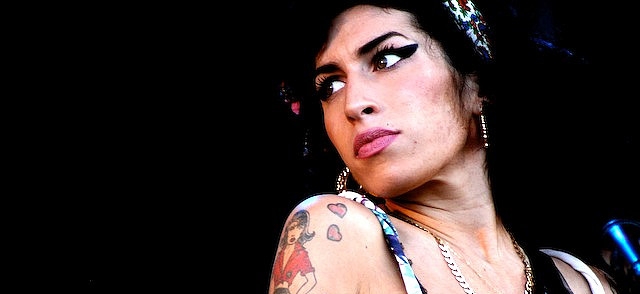Amy Winehouse remembered
Amy Winehouse September 14, 1983-July 23 2011

Photo by fyunkie/Flickr
Posted: Mon Jul 25 2011
The British singer was found dead in her North London home on Saturday, age 27. Sources say she died of a drug overdose. Time Out writer Sophie Harris met Amy Winehouse in the UK 2003 and reflects on her story here.
The first – and only time – I met Amy Winehouse was in 2003, around the release of her debut album, Frank. I was being interviewed about music on a London radio show that also featured live performances from up-and-coming artists, and Winehouse was that Saturday’s talent. The singer strolled into the Green Room, bold as brass, wearing leopard-print leggings and stiletto heels. Ooh, isn’t your dress lovely, she said to me, beaming. In the studio, she strummed a baby-acoustic guitar and sang, beautifully. She didn’t sound quite like anyone else, from the get-go. (You know, of course, that this isn’t sycophancy – of all the trillion criticisms and comments levelled at Winehouse, none have seriously questioned her talent). Winehouse seemed to have the world at her fuck-me pumps.
The first – and only time – I saw Amy Winehouse perform in concert was at the Glastonbury Festival in 2008. She was appearing before Jay-Z, and the bill was the subject of much tabloid speculation in Britain. Jay-Z was the first rapper to headline Glastonbury and Britain’s trashy red-top papers speculated that 'music fans' might stay away ('I'm not having hip-hop at Glastonbury,' burbled Noel Gallagher, 'It’s wrong'). The other nasty bit of speculation going around was that Winehouse either wouldn’t make the show (she’d just been in hospital) or wouldn’t be alive for very much longer.
How gloriously wrong both artists proved the gutter press that night. Jay-Z’s freestyling would give a young, free-associating Bob Dylan a run for his money (and Jay-Z knew it, grinning and removing his shades). And Winehouse was buoyant. A bit pissed, probably (pissed in the boozy, British sense of the word), but very jolly, not least when singing a bastardized version of 'Free Nelson Mandela' to her imprisoned husband, Blake Fielder-Civil. 'Free Blakey, my fella!' she sang. That she also punched a fan at the show seemed par for the course.
Maybe Winehouse was alright after all? Maybe she’d make another album? Three years on, the singer had even started playing shows again, booking a 12-date European tour. Maybe she wouldn’t fall into that bloody awful rock star cliché of dying at 27 (Joplin, Hendrix, Cobain, Morrison…)
But after being booed off-stage in Belgrade, Winehouse cancelled dates in Istanbul and Athens, and everyone started feeling uneasy again; her manager released a statement on her website, saying: 'Amy Winehouse is withdrawing from all scheduled performances. Everyone involved wishes to do everything they can to help her return to her best.'
We all have our own opinion of Amy Winehouse and her music. Most Brits followed her story, at least vaguely, in the press; shaking our heads in wonder at why she stayed with Blake, and why she squandered her talent.
Tributes to the singer have been numerous and heartfelt. Mark Ronson, who produced Winehouse’s Back to Black breakthrough album, wrote: 'She was my musical soulmate and like a sister to me. This is one of the saddest days of my life.'
The British newspaper, The Guardian, interviewed pub-goers at Winehouse’s local:
'Some people might think it shows disrespect to come out drinking tonight but she was such a part of Camden she made it her home and she always got involved,' said Mary Gallagher. 'Amy even worked behind the bar here. She was such a lovely person and, to be honest, I don't think fame agreed with her. She was an ordinary girl at heart.'
And Daptone Records released the following statement:
'We are very sad to have lost Amy Winehouse. She was one of a kind and we were fortunate to have had the chance to make music with her. She was always gracious and a pleasure to work with in the studio and on the road. She brought a lot of people joy with her voice and her irreverent personality. It is a tragedy that she was taken from us so soon when she had much more music to give.'
She was one of a kind, yep. She seemed like a sweet, messed-up person, and quite aside from the albums we’ll never get to hear now, Winehouse’s death is a crying shame for that reason.
Tweets
- About Us |
- Work for Time Out |
- Send us info |
- Advertising |
- Mobile edition |
- Terms & Conditions |
- Privacy policy |
- Contact Us
Copyright © 2014 Time Out Tokyo














Add your comment